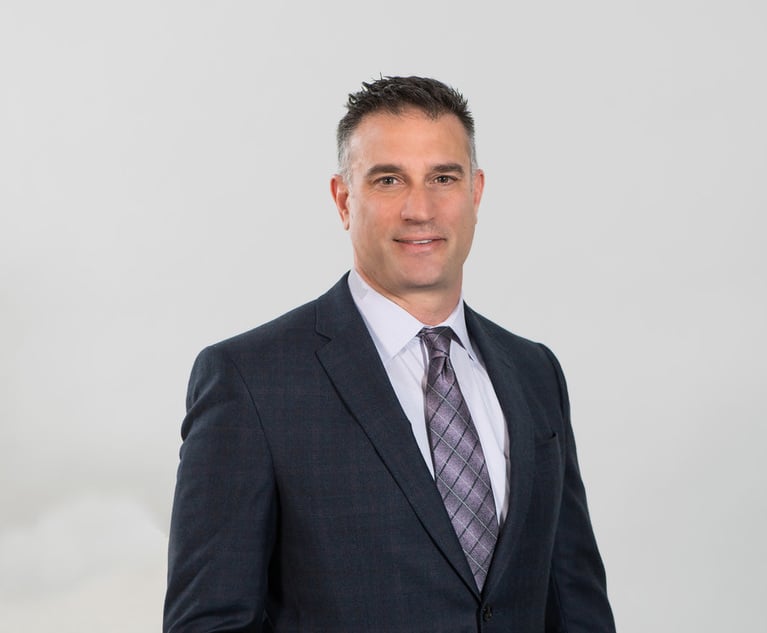Education Law Center Complaint Illustrates Why Complacency Is a Foe of Justice
One of the greatest threats to equality is complacency. Those who do nothing while witnessing injustice and wrongdoing, Dr. Martin Luther King Jr. once said, do worse than those who commit acts of injustice.
December 21, 2017 at 01:54 PM
6 minute read

One of the greatest threats to equality is complacency. Those who do nothing while witnessing injustice and wrongdoing, Dr. Martin Luther King Jr. once said, do worse than those who commit acts of injustice. Social scientists, too, recognize that complacency is a foe of justice; they have long recognized that bystanders become part of injustice, emboldening bad actors by suggesting to them that their conduct is unobjectionable. And when acts of injustice are against children, who often cannot protect themselves, complacency is all the more troubling. It is no surprise, then, that federal civil rights laws impose liability on school districts that ignore wrongdoing against children. Section 504 of the Rehabilitation Act of 1973, for example, imposes liability on school districts that fail to intervene when a child with disabilities is bullied.
That said, we often overlook complacency's role in perpetuating inequality. Sure, the idea that complacency threatens equality is intuitive, but identifying how complacency undermines specific civil rights can prove difficult. Complacency impedes civil rights in insidious ways. When school districts ignore injustice, though, the consequences are hard to overlook.
The Education Law Center (ELC), a nonprofit based in Philadelphia, knows this well. This summer ELC filed a complaint with the Office of Civil Rights, U.S. Department of Education, alleging that the School District of Philadelphia is violating Section 504 by failing to properly address bullying. The complaint illustrates not only how complacency contributes to inequality but also how Section 504 polices complacency in schools.
Section 504: A Bulwark Against Complacency
Section 504 guarantees children with disabilities equal access to an education. To that end, it requires school districts to provide children with disabilities a free and appropriate public education (FAPE); it requires districts to provide each child with disabilities an educational program designed to afford her meaningful educational progress.
Oftentimes, bullying thwarts a child's right to FAPE. As the ELC's complaint points out, bullying can distract a child from her schoolwork, cause her to suffer paralyzing anxiety in school, and cause her to miss school altogether. (StopBullying.gov confirms that these are common effects of bullying.) When bullying has these effects, the child is denied an opportunity to make meaningful educational progress, and Section 504 demands action. The child's school district must take steps to stop the bullying and correct the denial of FAPE. Complacency by the district perpetuates the denial of FAPE; complacency denies the child equal access to an education.
The ELC's complaint outlines what a school district should do when a child with disabilities is bullied. The district should first investigate the bullying, then meet with the child's teachers and parents to determine the effects of the bullying, and finally, determine the interventions necessary to safeguard the child's right to FAPE. Appropriate interventions might include separating the child from her bullies during the school day, allowing the child to transfer to a new school, or affording the child an aide for part of the school day.
The Consequences of Complacency
The ELC's complaint describes the experiences of several children who have suffered bullying within the School District of Philadelphia. Each child's experiences show how complacency contributes to inequality, but one child's experiences are particularly instructive.
The child, who I'll call “Jack,” was a fourth-grader when he first reported bullying. At the time, the school district had identified Jack as a child with a specific learning disability and attention deficit hyperactivity disorder. In other words, the district had identified him as a child who qualifies for Section 504's protections.
In the middle of fourth grade, Jack told his mother that peers were calling him names, punching him, and pushing him. He also reported that the peers pushed him down a flight of stairs. Jack's mother notified the school district about the bullying, but the district did not act. The district neither investigated the bullying nor considered its impact on Jack's education. Instead it embraced complacency.
So, Jack's mother requested that the school district transfer Jack to a new school. A transfer, she thought, was the only way her son could access a safe, bully-free learning environment. The district, however, denied her request.
Forced to endure the ongoing bullying, Jack developed intense anxiety about school, which caused him to refuse to attend school. When his mother tried to drop him off at school, for example, he cried and held onto his seat, begging her not to force him into the building. By the end of fourth grade, Jack had accumulated over 90 absences.
Compounding Jack's educational woes, the school district punished his family for the absences. The district's complacency led to misunderstanding about Jack's absences and the misunderstanding led the District to treat the absences as truancy. The district sent Jack's mother to Truancy Court, requiring her to use her family's resources to defend herself, rather than to help Jack.
Accepting as true this description of Jack's experiences, complacency thwarted his educational rights in two specific ways. First, the school district's complacency subjected Jack to a dangerous school environment—one that disrupted his learning process and undermined his attendance. Second, the complacency created barriers to Jack realizing his right to FAPE. It led to truancy proceedings which not only stigmatized Jack's mother but also detracted from her efforts to secure educational opportunity for him.
Conclusion
On Nov. 28, the Office of Civil Rights decided to exercise its enforcement authority and investigate the ELC's complaint. The office may find that the ELC's allegations are unfounded, or it may conclude that the ELC has identified a systemic failure within the School District of Philadelphia. We don't know what the investigation will uncover. But we do know, thanks in part to Dr. King and social science research, that we cannot accept complacency—especially when it comes to our kids.
Kevin Golembiewski is an associate with Berney & Sang. He focuses his practice on appeals, education law and employment law.
This content has been archived. It is available through our partners, LexisNexis® and Bloomberg Law.
To view this content, please continue to their sites.
Not a Lexis Subscriber?
Subscribe Now
Not a Bloomberg Law Subscriber?
Subscribe Now
NOT FOR REPRINT
© 2025 ALM Global, LLC, All Rights Reserved. Request academic re-use from www.copyright.com. All other uses, submit a request to [email protected]. For more information visit Asset & Logo Licensing.
You Might Like
View All
Government, May I Fix My GST Mistake? Regulations Offer Guidance on Generation-Skipping Tax Exemption Allocation Relief
9 minute read
Litigating the Written Word: Parol Evidence Rule and the Gist of the Action Doctrine in Fraud Claims
6 minute read

Lessons From Five Popular Change Management Concepts: A Guide for Law Firm Leaders in 2025
Trending Stories
- 122-Count Indictment Is Just the Start of SCOTUSBlog Atty's Legal Problems, Experts Say
- 2Judge Rejects Walgreens' Contractual Dispute Against Founder's Family Member
- 3FTC Sues PepsiCo for Alleged Price Break to Big-Box Retailer, Incurs Holyoak's Wrath
- 4Greenberg Traurig Litigation Co-Chair Returning After Three Years as US Attorney
- 5DC Circuit Rejects Jan. 6 Defendants’ Claim That Pepper Spray Isn't Dangerous Weapon
Who Got The Work
J. Brugh Lower of Gibbons has entered an appearance for industrial equipment supplier Devco Corporation in a pending trademark infringement lawsuit. The suit, accusing the defendant of selling knock-off Graco products, was filed Dec. 18 in New Jersey District Court by Rivkin Radler on behalf of Graco Inc. and Graco Minnesota. The case, assigned to U.S. District Judge Zahid N. Quraishi, is 3:24-cv-11294, Graco Inc. et al v. Devco Corporation.
Who Got The Work
Rebecca Maller-Stein and Kent A. Yalowitz of Arnold & Porter Kaye Scholer have entered their appearances for Hanaco Venture Capital and its executives, Lior Prosor and David Frankel, in a pending securities lawsuit. The action, filed on Dec. 24 in New York Southern District Court by Zell, Aron & Co. on behalf of Goldeneye Advisors, accuses the defendants of negligently and fraudulently managing the plaintiff's $1 million investment. The case, assigned to U.S. District Judge Vernon S. Broderick, is 1:24-cv-09918, Goldeneye Advisors, LLC v. Hanaco Venture Capital, Ltd. et al.
Who Got The Work
Attorneys from A&O Shearman has stepped in as defense counsel for Toronto-Dominion Bank and other defendants in a pending securities class action. The suit, filed Dec. 11 in New York Southern District Court by Bleichmar Fonti & Auld, accuses the defendants of concealing the bank's 'pervasive' deficiencies in regards to its compliance with the Bank Secrecy Act and the quality of its anti-money laundering controls. The case, assigned to U.S. District Judge Arun Subramanian, is 1:24-cv-09445, Gonzalez v. The Toronto-Dominion Bank et al.
Who Got The Work
Crown Castle International, a Pennsylvania company providing shared communications infrastructure, has turned to Luke D. Wolf of Gordon Rees Scully Mansukhani to fend off a pending breach-of-contract lawsuit. The court action, filed Nov. 25 in Michigan Eastern District Court by Hooper Hathaway PC on behalf of The Town Residences LLC, accuses Crown Castle of failing to transfer approximately $30,000 in utility payments from T-Mobile in breach of a roof-top lease and assignment agreement. The case, assigned to U.S. District Judge Susan K. Declercq, is 2:24-cv-13131, The Town Residences LLC v. T-Mobile US, Inc. et al.
Who Got The Work
Wilfred P. Coronato and Daniel M. Schwartz of McCarter & English have stepped in as defense counsel to Electrolux Home Products Inc. in a pending product liability lawsuit. The court action, filed Nov. 26 in New York Eastern District Court by Poulos Lopiccolo PC and Nagel Rice LLP on behalf of David Stern, alleges that the defendant's refrigerators’ drawers and shelving repeatedly break and fall apart within months after purchase. The case, assigned to U.S. District Judge Joan M. Azrack, is 2:24-cv-08204, Stern v. Electrolux Home Products, Inc.
Featured Firms
Law Offices of Gary Martin Hays & Associates, P.C.
(470) 294-1674
Law Offices of Mark E. Salomone
(857) 444-6468
Smith & Hassler
(713) 739-1250





